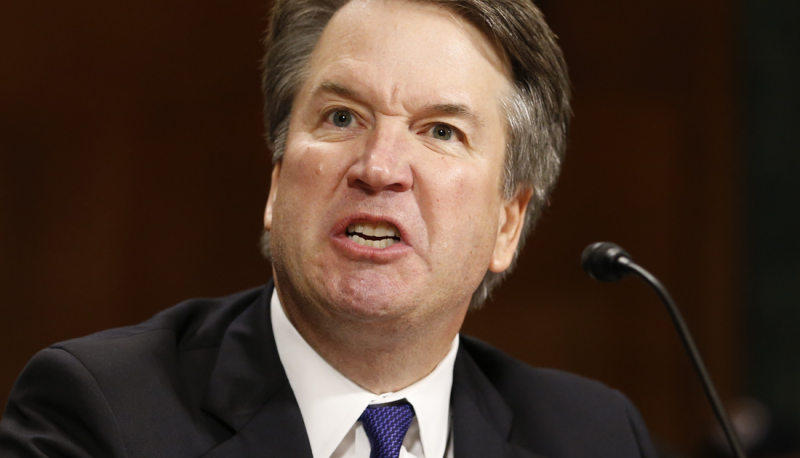“Confirmed Judges, Confirmed Fears” is a blog series documenting the harmful impact of President Trump’s judges on Americans’ rights and liberties. Cases in the series can be found by issue and by judge at this link.
On the same day that the Supreme Court voted, likely with the votes of Trump justices, to hear a Mississippi case that threatens to overturn Roe v Wade, Trump justices Brett Kavanaugh, Neil Gorsuch, and Amy Coney Barrett cast deciding votes to overturn an important criminal justice precedent that could harm countless wrongfully convicted individuals. The 6-3 May 2021 decision was in Edwards v Vannoy.
The Supreme Court ruled last year in Ramos v. Louisiana that it violates the Constitution to convict someone of a serious crime without a unanimous jury verdict against the individual. Thedrick Edwards, a Black man, was convicted of armed robbery and other crimes by a 10-2 jury vote, and his conviction should therefore be unconstitutional. Edwards was sentenced to life imprisonment without parole. Because his conviction occurred in 2007 and his direct appeal was rejected some eight years before Ramos was decided, however, the question before the Supreme Court was whether Edwards could obtain federal collateral review of his conviction and have it invalidated under the Ramos decision.
In a 6-3 decision written by Trump Justice Kavanaugh, in which Trump justices Gorsuch and Barrett also provided deciding votes, the Court majority said no. Kavanaugh explained that the unanimous jury requirement was a “procedural rule” relating to how a person is prosecuted and convicted, not a “substantive rule” concerning what conduct can “constitutionally be criminalized.” According to a Supreme Court decision more than 30 years ago in the Teague case, Kavanaugh noted, such a “procedural” decision will not be applied “retroactively” to cases where the direct appeal has been completed, like Edwards’ case, unless the new “procedural rule” is a very significant or “watershed” rule of criminal procedure. Without specifically attempting to determine whether the unanimous jury requirement was such a “watershed” rule, however, Kavanaugh noted that the “watershed” exception had never been used by the Court and therefore effectively overruled Teague. Specifically, Kavanaugh held that the “watershed exception is moribund,” and that from now on, “[n]ew procedural rules do not apply retroactively” to cases like Edwards’ that are on “federal collateral review.”
Justice Elena Kagan strongly dissented, on behalf of herself and Justices Stephen Breyer and Sonia Sotomayor. Proceeding to answer the question that Kavanaugh did not, Justice Kagan noted that the majority in Ramos described the unanimous jury verdict requirement as “vital,” “essential,” “indispensable,” and “’fundamental’ to the American legal system.” She also pointed out that Ramos “vindicated core principles of racial justice,” since state laws allowing non-unanimous juries “originated in white supremacism” and have continued to have “racially discriminatory effects.” “If you were scanning a thesaurus for a single word to describe the decision” in Ramos, she concluded, “you would stop when you came to ‘watershed.’”
The decision against Thedrick Edwards, Kagan went on, thus depended on “the majority’s last move – the overturning of Teague’s watershed exception.” Kagan criticized the majority’s departure from “judicial practice and principle,” noting that Kavanaugh followed “none of the usual rules of stare decisis” and respect for past precedent. In particular, she went on, Kavanaugh’s opinion “discards precedent without a party requesting the action,” and “does so with hardly a reason given, much less the ‘special justification’ our law demands.”
The result of the majority’s decision goes far beyond the important unanimous jury rule, Kagan explained. It “prevents any procedural rule ever – no matter how integral to adjudicative fairness –” from applying to federal collateral review of a state criminal conviction. As Professor Steven Vladeck noted, the decision “portends a fundamental shift” in how the Court “handles claims from all state and federal prisoners based upon decisions handed down after their conviction.”
As Justice Kagan concluded, if the decision in Ramos was correct that the right to a unanimous jury verdict “is so fundamental” and that a verdict issued by a divided jury “is no verdict at all,” then “Thedrick Edwards should not spend his life behind bars over two jurors’ opposition.” As a result of the opinion of Trump Justice Kavanaugh and the deciding votes of Trump justices Gorsuch and Barrett, however, that is exactly what will happen. The decision not only will have other harmful consequences in the criminal justice system, but also raises serious concerns about how the Court majority will treat the key precedent of Roe v Wade in its abortion case next term. Our fight for our courts must continue, and we must do all we can to help confirm Biden nominees to the federal courts at all levels.

